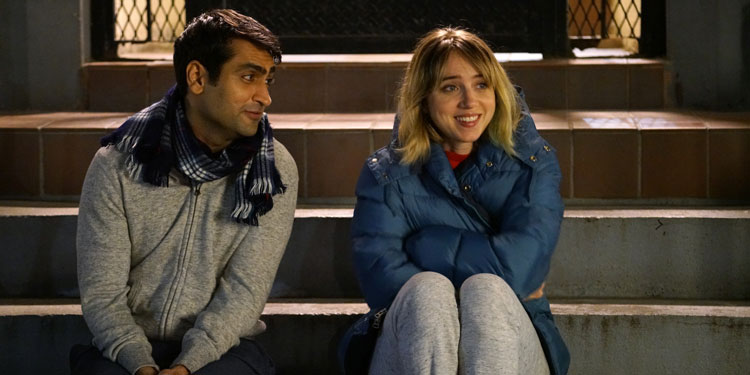 Starring: Kumail Nanjiani, Zoe Kazan, Holly Hunter, Ray Romano, Anupam Kher
Starring: Kumail Nanjiani, Zoe Kazan, Holly Hunter, Ray Romano, Anupam Kher
Directed By: Michael Showalter
Running Time: 120 mins
BBFC Certificate: 15
UK Release Date: November 20th 2017 (UK)
Despite the presence of executive producer Judd Apatow (40 Year Old Virgin, Knocked Up) and plenty of ecstatic reviews, The Big Sick wasn’t the breakout international hit many had crossed their fingers it would be. That said, the fact a movie about a Pakistani-born man raised as a Muslim got a mainstream release seems like progress.
Kumail (Kumail Nanjiani) was born in Pakistan but was brought to the US by his parents when he was still a kid. Now he’s living between two worlds, with his family still keen for him to be a good Muslim and have an arranged marriage with a nice Pakistani girl, while he’s not sure what he thinks about God and wants to be a stand-up comic.
He meets Emily (Zoe Kazan) at a gig and the two begin to date. However, he knows that there’s a good chance that if he told his family he was with a white girl, they would reject him. After the two have an enormous blow-up, Emily falls ill, which results in her having to be put into a medically induced coma. This brings Kumail into contact with Emily’s parents (Holly Hunter and Ray Romano), who aren’t sure about the young man, or whether he ought to be around after he broke their daughter’s heart.
There are moments during The Big Sick where you may be tempted to think it’s stretching credulity or taking a bit of a strange turn. However, with all of these oddities, it turns out they’re in the movie because they happened in real-life.
The plot is a fictionalised take of Kumail Nanjiani courtship with his now wife Emily V. Gordon, who then worked together on the script. It means that when Emily suddenly falls into a coma, which initially comes across as a tiny bit strange and convenient (especially at the point it comes in the movie), it’s because the real Emily had a serious, life-threatening illness.
The couple took three years to write the script, with the likes of Judd Apatow giving them notes to help them hone the story and dialogue. That extended writing period and the sense that neither of them put their own ego above the story, allows it to be a sharp, clever and sometimes very funny movie. Even when it turns darker in the second half, it still retains its sense of humour.
The screenplay also realises that there are moments when looking for a filmic ‘truth’ is more important than just echoing the actual events and character. That results in some smart fictionalisation, such as making Emily’s movie parents different to her real ones. It allows the movie to more effectively compare and contrast Emily’s American parents with Kumail’s Pakistani ones in an interesting, intelligent way. The movie never really criticises either parents, instead deftly showing why their very different experiences of the world make them see things in different ways. That in turn helps illuminate why the culture clash for their children initially seems so intractable.
The movie challenges stereotypes about Pakistanis and Muslims in often humorous ways. It doesn’t hide the challenges or suggest everything is perfect, but constantly reminds the viewer that there may be different ways to look at things, and that underneath the cultural differences, the human emotions are the same.
For example with arranged marriages, the western stereotype would suggest they were always about forcing someone to marry against their will, as the family’s ‘honour’ and social standing are more important than the happiness of the couple. Here though, it’s clear that for right or wrong, Kumail’s parents genuinely believe it’s what’s best for their child and will make him happy in the long run. Equally, his mother’s obsession with introducing him to single Pakistani girls is far removed from the stereotype of the people getting married having no say in the matter and barely meeting the person beforehand.
The film is smart enough to say that while with arranged marriages and other things, they may be different and/or more complex than we might initially think, that doesn’t mean there aren’t problems and pressures on a human level. That includes Kumail being somewhat trapped between his own desires and those of his parents, as well as a very smart scene involving one of the women Kumail’s mother has introduced him to. She talks about the pressure to marry and weight of expectation she feels. It’s written in a way that acknowledges the difficulties may be similar but more pronounced for women. It’s a vital moment as it stops these women just being props for a man’s story.
It’s one of the things that helps set the movie apart, that it is acutely aware of the issues of race, gender, religion, and even level of funniness that it’s dealing with, and has empathy for all of them. Not just that but it also knows that to promote understanding it can’t get too bogged down in all this. Instead it finds the humour in the situations, helped by a very charming, self-deprecating turn from Silicon Valley star Kumail Nanjiani.
Overall Verdict: Many films are said to be ‘bittersweet’, and that’s very true here. The Big Sick doesn’t hide from the darkness of some of the issues it raises, but it also looks hard for the humour and empathy, showing a different side to Muslims and interracial relationships than the mainstream is used to.
Reviewer: Tim Isaac
Special Features:
A Personal Journey: The Making Of The Big Sick
The Real Story
The Bigger Sick: Stick Around for More Laughs
The Big Sick: The Other Stuff
2017 SXSW Film Festival Panel
Cast&Filmmaker Commentary
Deleted Scenes
You must be logged in to post a comment.